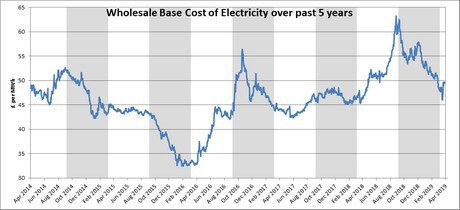Simply put… there isn’t a steadfast rule to this and it isn’t always in the summer which is a common misconception.
In the contracts team, we help NFU members procure thousands of contracts every year. Our customer’s supplies range from small farm buildings to large pump houses, vegetable stores and poultry sheds. The importance of a good, fair price remains the same and picking the best time of year can be tricky.
What can cause energy prices to rise?
To first understand when to expect lower prices, we need to think about what causes prices to rise. The energy market can be a pretty volatile place, however, some of the main drivers for price are:
Supply shortages
Whether it’s nuclear, renewable, gas or oil shortages can create uncertainty.
Short term demand
In the short term if there is a significant increase in the need for heating, cooling or lighting.
Long term demand
Overall demand is ever increasing in the UK and the requirement to support new technologies such as an increase in electric vehicles will definitely require more energy.
Third party costs
Around 50-60% of the unit rates you pay on your electricity bills are made up of third party costs. These are made up of various charges set by distribution and the government to cover the cost of getting the energy to you, supporting generation and regulatory charges. These costs are revised every April and usually go up.
Weather conditions
Though high winds can increase wind turbine generation and rain and snow can help with hydropower generation, extreme temperatures can affect the demand for electricity and gas for both cooling and heating.
Coal, Carbon and Oil prices
A rise in costs for these can increase the cost to generate electricity and demand for alternatives.
Financial market
In periods of financial instability such as recessions and even Brexit negotiations a drop in the value of the pound can create volatility.
Political unrest
Political changes that may affect energy sources worldwide can create uncertainty and volatility.
World events
Wars, unrest and natural disasters can wreak havoc on the energy market – particularly if they’re happening in areas close to fuel sources or generators.

Demand is lower in the summer so surely that’s the best time?
Typically it would seem right to assume that with so many unpredictable factors, wouldn’t it make sense to aim for the summer when demand is at its lowest? Unfortunately, if we look at past years, it’s still not that simple. During heat waves demand for both domestic and commercial cooling increases, which can bring prices up rather than down.
To check out what can be done to try and get the best fair price, read the rest of the article at NFU Energy.
